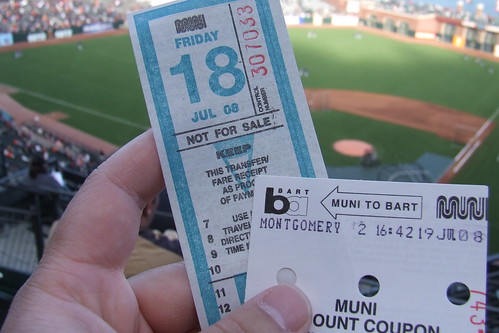
One frequent complaint I notice on my Twitter feed is about the 90-minute transfer policy on Clipper cards and it being so strict versus paper transfers that can have an expiration that wildly varies, and in some cases at least two hours.
Let's do a comparison of the two transfers.
Muni Paper Transfers:
- Issued at time of purchase, that is, if the passenger takes one.
- Easy to show to fare inspector.
- Expiration time may vary. Muni policy requires 90 minutes, but some drivers do not change the time too often, so they put extra time. Some may get two hours, while if a driver forgets to fix the time, a passenger may get a short expiration.
- Easy to identify when it expires based on the time the transfer was cut.
- If done using Muni, can give transfer to another passenger to use.
- "Late night" transfers can be issued starting at 8:30PM and expires at 5AM the next day.
- Mass printing of transfers for drivers every single day, causes littering (especially at terminal stops).
- Automatically issued on first tag on reader. No need to ask driver for one.
- Fare inspectors must use their card reader to verify validity (non-expiration).
- Strict 90 minute time limit. No more, no less.
- Not easy to identify when it expires. Only will show expiration time when tagged on their first transfer to another vehicle or station. Since Muni metro's "Proof of Payment" policy requires a transfer to be valid, it's hard to track when it will expire and a new fare must be paid. Passengers will need to use a stopwatch or keep an eye on what time it would expire. Clipper did admit there was a glitch causing some vehicles internal clocks to not be synced with all others.
- If done using Muni, can't give away e-transfer on Clipper card with another passenger. But can if it's the last ride on a Limited Use Ticket.
- No "late night" e-transfers issued. Muni rejected this at a past Clipper/TransLink board meeting.
- No paper waste and littering.
If I ran Muni...
I'd extend Clipper e-transfers to two hours because there's no simple way to identify when the e-transfer expires. Paper transfers would still be issued for people who pay with cold hard cash, as there's no way to fairly enforce the "Proof of Payment" system without some kind of fare receipt.
5 comments:
electronic transfers for me (I hate fishing in my pockets for the paper), except for the late-night transfers where Clipper customers get screwed.
Also, on the "Sunday Funday" last week, I got screwed and charged twice even though my Clipper transfer should have been good all day. I need to call Clipper and get a refund for that.
IMO, if they want everyone to use Clipper, the policies need to be exactly the same for cash/electronic transactions.
Benefit number 300,000,000 for non-paper passes: multiple hundreds of millions of your tax dollars flow directly into the pockets of MTC's very very very very Special Friends at defense contractor Cubic.
Nice work if you can get it.
PS The world's most-used per capita public transportation system, the country of Switzerland, evaluated and rejected "smart card" ticketing a decade ago, finding it had negative utility, with costs (ie public-private wealth transfers, slowed boarding, massive infrastructure costs at stations) far outweighing any hypothetical benefits. The country continues to use "old fashioned" pieces of paper and uniform proof of payment on all modes of transit, and remains the most successful in the world.
Just imagine that: evaluating half a billion or so of capital expense pork before forking over!
One more difference between them: paper transfers work even if you use another type of transit (such as BART)in between Muni rides. Clipper will cancel your Muni transfer and require you to buy a new Muni fare if you use BART in between Muni rides, albeit they will charge you the discounted BART-Muni transfer rate. This info is not yet available on their website, but Clipper has assured me that there is some "BART cancels Muni transfer rule" in effect.
I was just going to post what Rai Sue said. I go to work on muni, then bart, then muni again. I'm ripped off an extra $1.75 every time i go to and from work! Why would i use the clipper card if i LOSE 3.50 every single day? It's ridiculous that this hasn't been addressed yet.
Rai Sue and Susan, I've experienced that too! It was $2 + $1.75 + $1.75 (Bus + BART + Bus) for me that day! The "solution" is that you should use Clipper only for BART OR Muni. If you have a paper transfer, you can simply hold on to that for your next bus.
This is very ironic, why would Clipper tell everyone that "one card is all you need, no hassle..." while it's better to have more than one payment method?
OT: AC Transit is like that too. Riders transfer from bus to BART, and then another bus. They're better off using regular BART tickets for their BART ride.
If they have to use two buses after their BART ride, then they can use Clipper. Bus transfers are one-use only.
Unlike Philadelphia, Boston, Phoenix... which one metropolitan area has one major transit system that you can use one pass for every city bus, subway and light rail, you have to pay separately in the Bay Area. Transfer discounts are minimal.
There is just no perfect solution for this.
Post a Comment